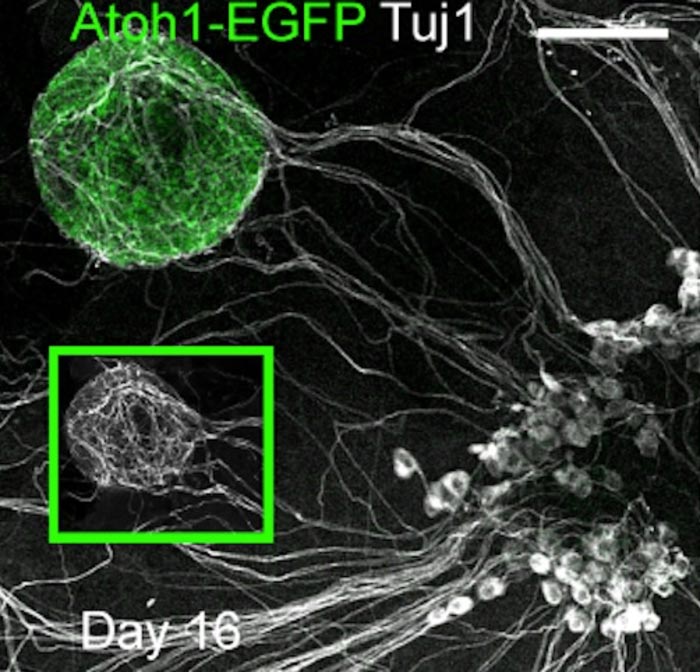Stem cells provide a model to understand sensorineural hearing loss

Stem cell researchers generated “cochlear organoids with functional synapses for the first time, which provides a platform for deciphering the mechanisms of sensorineural hearing loss,” opening up avenues for investigating new therapeutic approaches.
Credit: Fudan University Eye Ear Nose and Throat Hospital in Shanghai, China
Disabling hearing loss affects one in every ten people and up to 25% of people over 60, according to the World Health Organization, and can have both genetic and environmental causes such as infections and noise exposure.
Sensorineural hearing loss, the most frequent form of hearing loss, is caused by damage to specialized cells in the cochlea called hair cells (HCs) and spiral ganglion neurons (SGNs), respectively, both of which are essential for hearing. Hair cells receive sounds as mechanical signals which are then turned into electrical impulses transmitted to the brain by SGNs. Once damaged or lost, the HCs and SGNs do not grow back, thus requiring the use of hearing aids or cochlear implants to facilitate normal / near-normal hearing.
Research into ways of regenerating those cells is limited by the lack of suitable lab-based models of cochlear physiology and function. In a recent paper published in Stem Cell Reports, Renjie Chai, Huawei Li, Wenyan Li and colleagues from the Fudan University Eye Ear Nose and Throat Hospital in Shanghai, China address this by generating cochlear avatars in the lab from stem cells. By carefully fine-tuning cell culture conditions, the researchers succeeded in growing stem cells isolated from mouse cochleae. The stem cells grew as 3D structures, so-called “organoids” and were then directed into cochlear HCs by adjusting culture conditions. Importantly, mouse SGNs added to the cultures connected with the HCs and transmitted electrical signals, an important step towards modelling cochlear function in the dish. According to the authors, this study has generated “cochlear organoids with functional synapses for the first time, which provides a platform for deciphering the mechanisms of sensorineural hearing loss,” opening up avenues for investigating new therapeutic approaches.
About Stem Cell Reports
Stem Cell Reports is an open access forum communicating basic discoveries in stem cell research, in addition to translational and clinical studies. Stem Cell Reports focuses on manuscripts that report original research with conceptual or practical advances that are of broad interest to stem cell biologists and clinicians. It is the society journal of the International Society for Stem Cell Research (ISSCR).
Journal: Stem Cell Reports
Article Title: Generation of innervated cochlear organoid recapitulates early development of auditory unit
Media Contact
Kym Kilbourne
International Society for Stem Cell Research
kkilbourne@isscr.org
Office: 443-995-2102
All latest news from the category: Life Sciences and Chemistry
Articles and reports from the Life Sciences and chemistry area deal with applied and basic research into modern biology, chemistry and human medicine.
Valuable information can be found on a range of life sciences fields including bacteriology, biochemistry, bionics, bioinformatics, biophysics, biotechnology, genetics, geobotany, human biology, marine biology, microbiology, molecular biology, cellular biology, zoology, bioinorganic chemistry, microchemistry and environmental chemistry.
Newest articles

Innovative 3D printed scaffolds offer new hope for bone healing
Researchers at the Institute for Bioengineering of Catalonia have developed novel 3D printed PLA-CaP scaffolds that promote blood vessel formation, ensuring better healing and regeneration of bone tissue. Bone is…

The surprising role of gut infection in Alzheimer’s disease
ASU- and Banner Alzheimer’s Institute-led study implicates link between a common virus and the disease, which travels from the gut to the brain and may be a target for antiviral…

Molecular gardening: New enzymes discovered for protein modification pruning
How deubiquitinases USP53 and USP54 cleave long polyubiquitin chains and how the former is linked to liver disease in children. Deubiquitinases (DUBs) are enzymes used by cells to trim protein…



